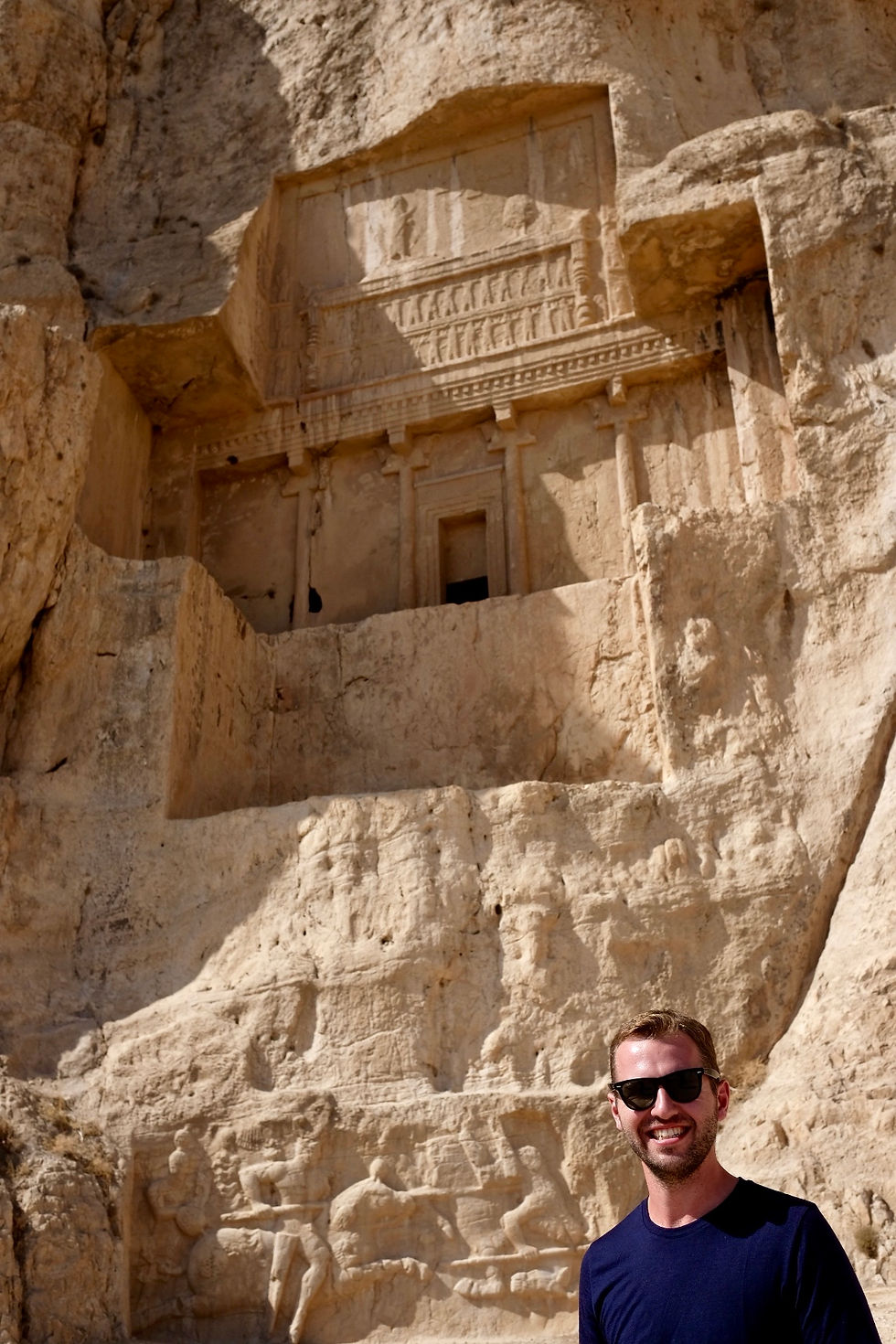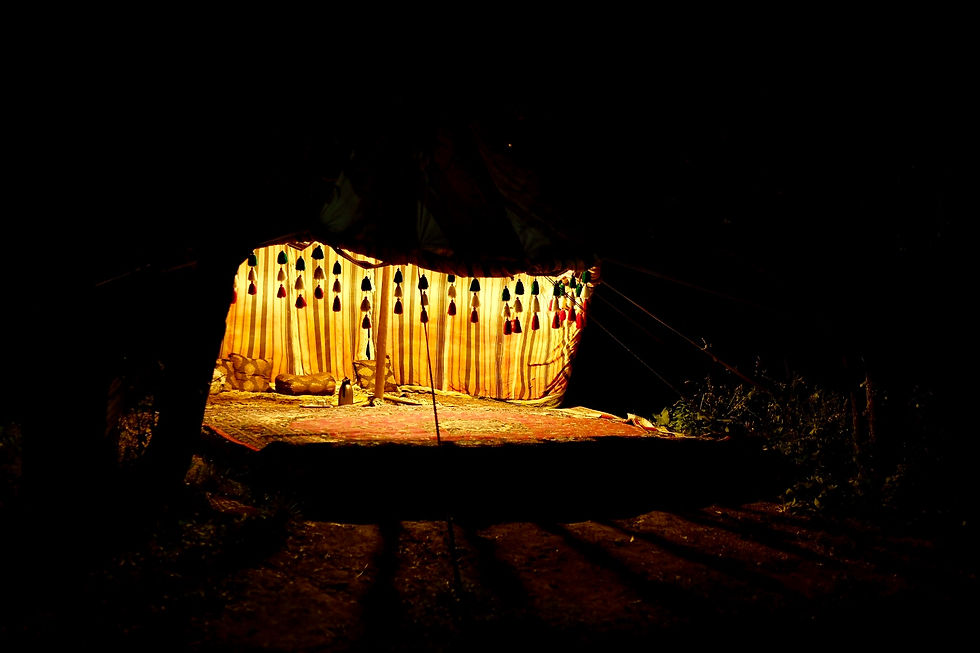Iran | All about Iranians
- Marta & Oskar
- Oct 2, 2018
- 5 min read
Iran surprised us in many ways. Some we will write about in future posts - like the apparent decision of Iranian drivers to embody the "rules are meant to be broken" motto. This admittedly excessively long post will be about another surprise - how the people we met are managing to maintain an infectious positivity in the face of harsh reality and uncertain future.
First came Reza, a guide from Shiraz who would take us around Persepolis, the ceremonial capital of the Achaemenid empire. Eyeing up this slightly corpulent and affable man, I could not tell where he fell on the many lines dividing Iranians today - their views on religion, on the theocratic regime, on the outside world. These unnecessary thoughts soon gave way to wonder as we entered the old capital through the Gate of All Nations. For once, the name was fitting - at the height of its powers, in 500 BC, the Achaemenid empire ruled over nearly 50% of the world’s population. Cyrus II, the empire’s founder, known for his religious tolerance, is the only non-Jewish figure to be called messiah in the Jewish Bible, Tanakh. Perhaps emboldened by Cyrus, Marta asked Reza if he was Muslim. “Definitely not”, came his immediate reply. “More and more people, mostly the young ones, are not. The oppressive nature of the Islamic regime sours the taste for Islam. Well, for any religion.”
On the way back to Shiraz, Reza invited us for tea to his house, a gesture that soon ceased to surprise. There we met Soraya, his wife and a Ph.D. candidate in linguistics at the Tehran University. Hours of chats followed, to be interrupted only by servings of yet another variety of Persian sweets and culminating in a cupful of paloodeh - a local specialty and a sleep-inducing amount of frozen sugar and rosewater. Soraya turned out to also be a translator and a publisher, having just completed the translation of Elizabeth Gilbert’s unfortunate classic, “Eat Pray Love”. It was ironic that this book became, if only for a short while, our guide around the peculiarities of the Islamic Republic. For starters, the economic isolation of the country means that copyright laws do not apply and translators can freely choose and publish whatever they please. The translation work itself requires a solid grasp of innuendo as local censorship laws forbid anything that relates to alcohol, sex or advocacy of other religions. How “Eat Pray Love” became anything more than a description of Italian and Balinese landscapes is only a testament to Soraya’s intellect.
High on sugar, we left Reza and Soraya and drove to Bazaar-e Vakil to get some dinner. Having arrived at a local cafe, we were seated at a large table next to a bubbly group of girls from the Shiraz University. With hijabs pulled so far back that they could as well be commonplace scarfs, they would not look out of place in any university bar. They soon chatted us up. Yasmin taught me how to haggle with the carpet merchants and how anyone called dadash, or bro, would feel obliged to lower their price. Azar was fascinated with our protracted engagement only to conclude that “marriage can wait”. Neda effectively promised to guide us around Iranian Kurdistan if only we asked. We soon turned to politics and the mood shifted momentarily. “Nothing will change, they will jail or kills us if we try to do anything”, Yasmin proclaimed. To which Azar added, “it will change; I just hope I will still be young when it does”. Visibly distraught, Neda asked to stop talking about it. And soon we were back to where we left off, laughing at my Farsi and sharing anecdotes, as if the discussion never happened.
Deflated and spirited at the same time, we decided to visit the local gardens around the tomb of Hafez to quiet the mind before the night. Looking for serenity, we instead encountered crowds of people congregating around the tomb set amidst the cypress garden - some singing, others chatting, others just sitting and watching the monument. Little did we know that Hafez, a 14th-century Shirazi poet, is believed to be the father of all Iranians. He lauded the joys of love and wine in his poems as often as he exposed religious hypocrisy. “With last night’s wine still singing in my head, I sought the tavern at the break of day”, starts one of his odes. It is delightfully ironic then that Divan-e-Hafez, collection of his work, is the only other book but Quran displayed on every Iranian table during Nowruz, the New Year celebrations.
We joined the crowds, finding an empty space beneath one of the columns. Not a minute passed before a girl sat next to us. Sara was a student from Tehran on a short trip to Shiraz. “I hate Iran”, was one of the first sentences she uttered in broken English. “I get panic attacks when I am here, I cry a lot. I will join my sister in Berlin one way or another”. And then she spent the rest of the evening telling us about her love for Hafez, a prophet for what, at that moment, seemed like a bygone era.
We left early next morning for the village of Kahkaram. Located in the foothills of the Zagros mountains, it is a quaint place of few houses and plentiful apple and quince orchards. There we met Farhad, our energetic 30-year old host and a member of the local Qashqai tribe. One of the last remaining nomadic groups of Iran, the Qashqai have inhabited Persia for over nine centuries, annually traversing the length of the country from the Persian Gulf to the highlands north of Shiraz. Numbering just over 500,000 people, they have long avoided government's attempts at assimilation. The number of threats to their traditional ways of living keeps growing - and yet, some like Farhad choose to stay. “I know everyone here, they are my family. Yes, it’s hard and it’s definitely not glamorous but I sleep better here than anywhere else and that must count for something”. We soon bought into the appeal, sipping thyme tea under the tent and looking beyond the mountains. A small puncture appeared when Farhad joined in. “I will tell you a secret. I have just applied for a Canadian visa. I will miss Iran but I can't see the future for my children here." "Do your parents know?", I asked gesturing at an elderly couple preparing dinner in the kitchen nearby. “No”, he answered.
Two days in, I am sitting in a pomegranate garden of our guesthouse in Taft, a small village in the desert of central Iran. It is owned by Ramtin and Tina, a local Zoroastrian couple. One of the oldest monotheistic religions in the world, Zoroastrianism was once the religion of the land but now counts only around 200,000 followers worldwide. Its core tenet is the belief in the cosmic and moral dualism of good and evil as well as the prediction of the ultimate victory of Ahura Mazda, the wise and the good in this world.
Surrounded by a quiet hum of nature with an inseparable glass of tea by my hand, I can only hope for this beautiful country that Zoroastrianism is right.



















Comments